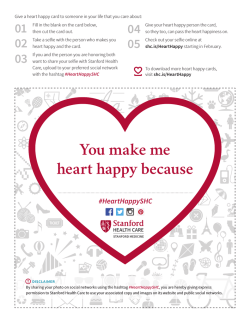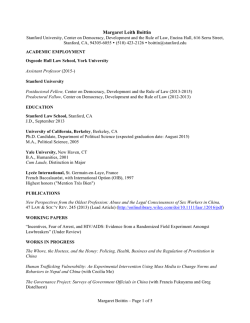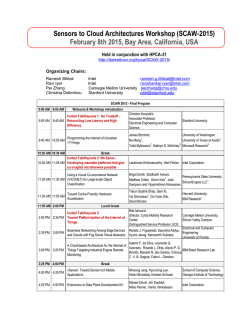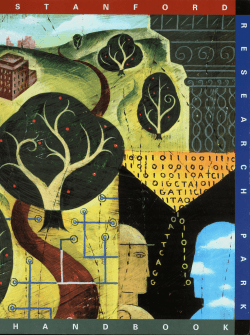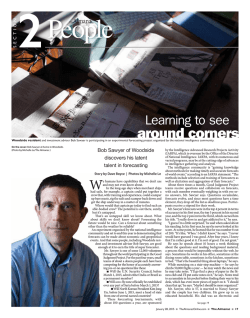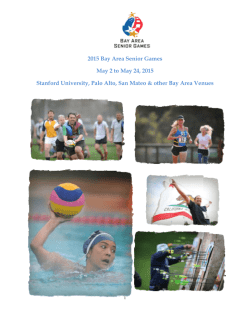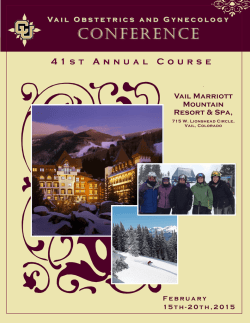
international humanitarian aid skills course - CME
INTERNATIONAL HUMANITARIAN AID SKILLS COURSE Featuring Case Studies, Didactics and Hands-On Skills Sessions February 7–8, 2015 Center for Clinical Sciences Research, Stanford, California A Continuing Medical Education Activity Presented by the Center for Innovation in Global Health at the Stanford University School of Medicine PROGRAM (subject to change) Saturday, February 7, 2015 Sunday, February 8, 2015 7:30 – 8:00 am Registration and Continental Breakfast 8:00 – 8:15 am 8:00 – 8:45 am Introduction, Preparedness, and Case Studies 8:15 – 12:00 pm OB Skills 8:45 – 9:45 am ID and Tropical Medicine for Surgical Care Continental Breakfast/ Networking Lectures Cesarean Section Postpartum Hemorrhage Management of preeclampsia/eclampsia 10:30 – 10:45 am Coffee Break/Networking Peripartum Sepsis 10:45 – 11:30 am Complex Wound Management in Low Resource Environment Skills Lab D&C technique 11:30 – 12:30 pm Fracture/Dislocation Management Basics Postpartum Hemorrhage: B-Lynch, Hemostatic Stitch, Intrauterine Tamponade Devices C-Section Delivery Techniques of Fetal Malposition Hysterectomy Key Points /Tubal Surgery 12:00 pm Course Evaluation 9:45 – 10:30 am Anesthesia in Low Resource Environments 12:30 – 1:15 pm Lunch/Participant Discussion 1:30 – 3:00 pm Skills Station Rotation #1 Group 1: Ortho Skills: External Fixation, Traction Pin Placement Group 2: Hand Cut Split Thickness Skin Graft Tendon Repair Craniotomy 3:00 – 3:30 pm Coffee Break/ Networking 3:30 – 5:00 pm Skills Station Rotation #2 Group 1: Hand Cut Split Thickness Skin Graft Tendon Repair Craniotomy Group 2: Ortho Skills: External Fixation, Traction Pin Placement Opportunities for Q&A will be provided after each presentation and during skills sessions. SPONSORED BY THE STANFORD UNIVERSITY SCHOOL OF MEDICINE To register and pay online, visit cme.stanford.edu/humanitarian INTERNATIONAL HUMANITARIAN AID SKILLS COURSE – FEBRUARY 7–8, 2015 LEARNING OBJECTIVES • Demonstrate the procedural steps and recognize the pitfalls in basic procedures utilized in humanitarian aid missions including: fracture management, cesarean section, post-partum hemorrhage, treatment of tubal pregnancy, wound/burn management, skin grafts, emergent burr holes, hand injuries, orthopedic dislocations, tendon repairs, low resource anesthetic techniques, management of tropical surgical diseases, and intrauterine evacuation. • Evaluate the influence of resource factors on surgical decision making in low resource environments and tailor their practice to the specific setting. ACCREDITATION The Stanford University School of Medicine is accredited bythe Accreditation Council for Continuing Medical Education (ACCME) to provide continuing medical education for physicians. CREDIT DESIGNATION CONFERENCE OVERVIEW Stanford University School of Medicine designates this live activity for a maximum of 10.5 AMA PRA Category 1 Credits™. Physicians should claim only the credit commensurate with the extent of their participation in the activity. ACCOMMODATIONS STATEMENT OF NEED This CME workshop will help prepare the International Humanitarian Aid Volunteer to function in a low resource setting for treatment of common surgical problems. In developing countries, the surgical volunteer must truly be a “generalist”, able to handle an array of surgical conditions. This 1 ½ day course will provide an overview of the scope of conditions that one might encounter in resource limited environments. Through a variety of techniques including skill stations and simulation, participants will familiarize themselves with several relevant procedures, as well as the essential elements of surgical safety, ethics, and cultural considerations in such settings. Specific skill areas that will be taught are orthopedic dislocations and fracture management with traction pins and external fixation, cesarean sections, post partum hemorrhage, burn management and hand cutting of skin grafts, burr holes, hysterectomy, uterine evacuations, tendon repairs, tropical medicine for surgical diseases, and low resource anesthetic techniques. Excellent accommodations are available with special conference rates at the Sheraton Palo Alto Hotel located within a ten minute drive of the conference location. The Sheraton Palo Alto Hotel is located at 625 El Camino Real, Palo Alto, CA 94301. Please ask for the International Humanitarian Aid Skills Course $169 conference rate. Occupancy tax is 12% and a California tourism tax of 0.07% will be charged per room night. A Convention and Visitors Bureau Tourism fee of $0.84 will be charged per room night. These taxes are not included in the room rate and are subject to change without notice. The Sheraton offers valet parking for $19 per day or self-parking for $14 per day. Electric vehicle charging stations are available to guests at no additional charge. For reservations call 1-800-325-3535 or (650) 328-2800. Rooms will be guaranteed at the special rate until January 16, 2015 (subject to availability). Thereafter, the Sheraton will provide rooms on a space available basis and the group rate will no longer be guaranteed. CONFERENCE LOCATION TARGET AUDIENCE This course will help prepare US trained physicians to participate in surgical procedures in low resource settings. The course will provide skills training in a number of basic surgical procedures, and is of interest to national physicians in family practice, general surgery, urology, obstetrics and gynecology, plastic surgery, and emergency medicine. Center for Clinical Sciences Research (CCSR) 269 Campus Drive Stanford CA 94305 http://campus-map.stanford.edu/ (search for CCSR) Directions and parking instructions will be emailed prior to the course. To register and pay online, visit cme.stanford.edu/humanitarian INTERNATIONAL HUMANITARIAN AID SKILLS COURSE – FEBRUARY 7–8, 2015 FACULTY Sherry M. Wren, MD, FACS Professor of Surgery Associate Dean, Academic Affairs Stanford University School of Medicine Chief, General Surgery Palo Alto Veterans Health Care System Course Director and Reviewer Susan Anderson, MD Adjunct Clinical Associate Professor Stanford University School of Medicine Caroline Bowker, MD Clinical Professor of Obstetrics & Gynecology Stanford University School of Medicine Laura Brodzinsky, MD Clinical Associate Professor of Obstetrics & Gynecology Stanford University School of Medicine Jolyn Chen MD Obstetrics and Gynecology Kaiser, San Leandro Medical Center R. Richard Coughlin, MD, MPH Clinical Professor, Department of Orthopedic Surgery University of California San Francisco Institute for Global Orthopedic and Traumatology Orthopaedic Trauma Institute/San Francisco General Hospital Kay Daniels, MD Clinical Professor of Obstetrics & Gynecology Co-Director of OBSim Stanford University School of Medicine Roberto Diaz, MD Clinical Instructor, Orthopaedic Surgery Stanford University School of Medicine Nicholas J. Giori, MD, PhD Associate Professor, Department of Orthopedic Surgery Stanford University Chief of Orthopedic Surgery, VA Palo Alto Health Care Richard Gosselin, MD, MSc, MPH, FRCS(C) Co-Director, Department of Orthopaedic Surgery Institute for Global Orthopedics and Traumatology University of California San Francisco Pratima Gupta, MD Obstetrics and Gynecology Kaiser, San Francisco Medical Center Kim Harney, MD Clinical Associate Professor, Obstetrics & Gynecology Maternal Fetal Medicine Stanford University School of Medicine Fred Hopkins, MD Clinical Associate Professor, Obstetrics & Gynecology Stanford University School of Medicine Peter Johannet, MD Clinical Assistant Professor of Surgery Stanford University School of Medicine Rebecca McGoldrick, MD Clinical Instructor, Anesthesiology, Perioperative and Pain Medicine Postdoctoral Research fellow, Anesthesiology, Perioperative and Pain Medicine Stanford University School of Medicine Rahim Nazerali MD, MHS Clinical Assistant Professor, Surgery Plastic & Reconstructive Surgery Stanford Health Care Amen Ness, MD Clinical Associate Professor, Obstetrics & Gynecology Stanford University School of Medicine Joanne M. Nino, MD Adjunct Clinical Instructor Stanford University School of Medicine Scott D. Oesterling, MD Adjunct Clinical Associate Professor, Obstetrics & Gynecology Stanford University School of Medicine Andrew Ringnes, MD Clinical Instructor, Orthopaedic Surgery Stanford University School of Medicine Kate Ayers Shaw, MD Clinical Assistant Professor, Gynecology Stanford University School of Medicine Stephen Skirboll, MD Associate Professor of Neurosurgery Stanford University Medical Center John S. Vorhies, MD Resident, Department of Orthopaedic Surgery Stanford University School of Medicine Faculty Disclosure The Stanford University School of Medicine adheres to ACCME Essential Areas, Standards and Policies regarding industry support of continuing medical education. Disclosure of faculty and commercial relationships will be made prior to the activity. REGISTRATION International Humanitarian Aid Skills Course February 7–8, 2015 Center for Clinical Sciences Research, Stanford, CA Space is very limited, please register early! Please go online and register at cme.stanford.edu/humanitarian. Cancellations received in writing before January 2nd, 2015 will be refunded, less a $100 administrative fee. No refunds will be made on cancellations received after this date. REGISTRATION FEE: $875 Registration fee includes tuition, course materials, continental breakfast and lunch on Saturday, February 7, and continental breakfast on Sunday, February 8. ACCEPTED METHOD OF PAYMENT: Credit Card (Visa and MC only) – Register online at cme.stanford.edu/humanitarian n Check made payable to Stanford University n PLEASE REGISTER AND PAY BY CREDIT CARD ONLINE. If you prefer to pay by check please contact the Stanford Center for CME at (650) 497-8554 (Note that your registration is not confirmed until payment is received). Stanford Center for Continuing Medical Education 1070 Arastradero Road, Suite 230 Palo Alto, CA 94304 www.cme.stanford.edu Phone: (650) 497-8554 Fax: (650) 497-8585 Email: [email protected] Please register early – space is limited! Stanford University School of Medicine is fully ADA compliant. If you have needs that require special accommodations, including dietary concerns, please contact [email protected] To register and pay online, visit cme.stanford.edu/humanitarian
© Copyright 2026
